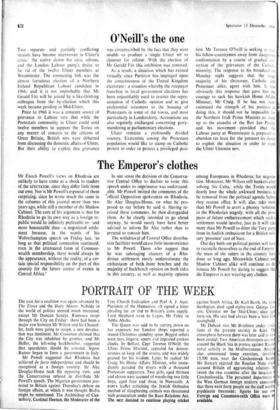O'Neill's the one
Two separate and partially conflicting strands have become interwoven in Ulster's crisis: the native desire for civic reform, and the London Labour party's desire to be rid of the twelve Ulster members at Westminster. The connecting link was the almost fortuitous election of a Northern Ireland Republican Labour candidate in 1966; and it is not improbable that Mr Gerald Fitt will be joined by a like-thinking colleague from the by-election which this week became pending in Mid-Ulster.
Prior to 1966 it was a constant source of grievance to Labour mPs that while the Protestant community in Ulster could send ttvelve members to support the Tories on - any matter of concern to the citizens of Great Britain, British MPS were debarred from discussing the domestic affairs of Ulster. But their ability to exploit this grievance was circumscribed by the fact that they were unable to produce a -single Ulster se to clamour for reform. With the election of Mr Gerald Fitt this inhibition was removed.
As a result, a situation which has existed virtually since Partition has impinged upon the consciousness of the United Kingdom electorate : a situation whereby the ratepayer franchise in local government elections has been unjustifiably used to restrict the repre- sentation of Catholic opinion and to give preferential treatment to the housing of Protestants in some of the towns, and most particularly in Londonderry. Accusations are also regularly exchanged concerning gerry- mandering at parliamentary elections.
Ulster reMains a profoundly divided country. Extremists among the Protestant population would like to stamp on Catholic protest in order to protect a privileged posi- tion. Mr Terence O'Neill is seeking to lead his fellow-countrymen away from dangerous confrontation by a course of gradual coo rection of the grievances of the Catholic minority. The response to his broadcast on Monday night suggests that the large majoritY of his electorate, Catholic and Protestant alike, agree with him. It was obviously this response that .gave him the courage to sack his hawkish Home Affairs Minister, Mr Craig. If he has not over- estimated the strength of his position in doing this, it should not be impossible for the Northern Irish Prime Minister to stand up to the assaults of the Rev Ian Paisley and his movement—provided -that the Labour party at Westminster is prepared to abandon (at least for the present) its desire to exploit the situation in order to expel the Ulster Unionist Aws.














































 Previous page
Previous page